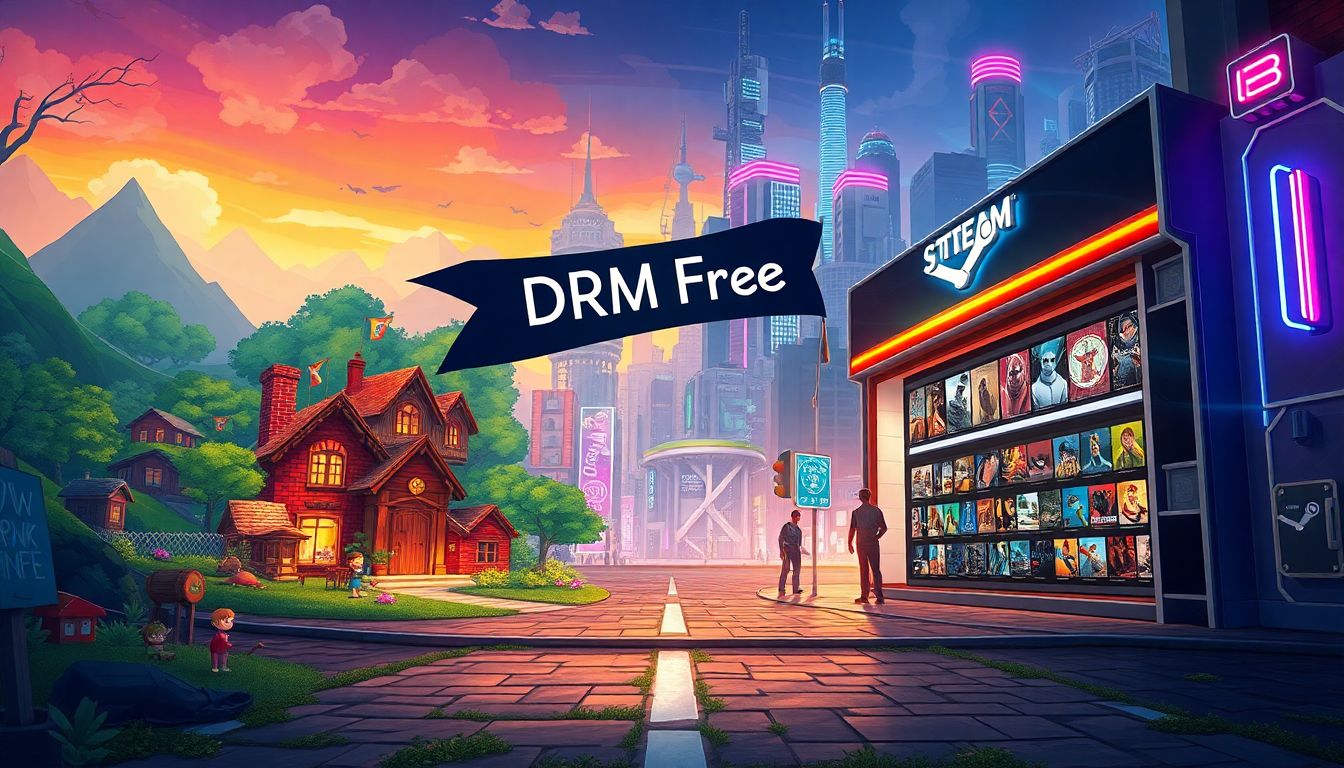DRM-Free vs. Steam: The Indie Renaissance Shaping Modern Gaming

DRM-Free vs. Steam: The Indie Renaissance Shaping Modern Gaming
Introduction
The way people find and buy games has changed a lot in recent years. More indie developers are making headway, and gamers are grabbing titles from many different sources. This shift is largely driven by how games are distributed online. Two main paths stand out: DRM-free games and Steam. Each has unique advantages and challenges. Both roads are helping fuel what many call the indie game renaissance—more creative, diverse, and accessible titles than ever before.
The Evolution of Digital Gaming Distribution
The Rise of Steam
Steam burst onto the scene in 2003, transforming how consumers access games. Its huge library, fast updates, and sales made it the go-to platform for millions. By 2023, Steam controlled around 75% of the digital PC game market, solidifying its dominance. It made digital game buying simple and convenient, opening the door for indie developers to reach a global audience without big publishers.
Emergence of DRM-Free Games
DRM, or digital rights management, is meant to protect game creators from piracy. But many gamers dislike its restrictions. DRM-free games skip these controls, allowing full ownership and easier transfer of their purchases. Platforms like GOG.com and itch.io champion this approach, giving gamers more freedom. Indie devs love the transparency and control DRM-free models offer.
Impact of Distribution Methods on Gamers and Developers
How games are delivered changes everything. DRM-free titles give players full ownership, making their library more portable. Developers who release DRM-free often find a loyal community eager for freedom in how they play. But limited exposure and piracy fears can be hurdles. Meanwhile, Steam offers massive reach and built-in features. Still, reliance on the platform means less control and some worries about platform restrictions.
Advantages and Disadvantages of DRM-Free and Steam Platforms
Benefits of DRM-Free Games
Buying DRM-free means owning your games outright. You can store them on any device or drive without worrying about license servers. Modding old games becomes easier, enriching experiences for fans. Plus, indie creators get direct support, with fewer middlemen taking a cut.
Challenges Faced by DRM-Free Titles
While freedom sounds great, it comes with issues. Smaller, DRM-free titles often struggle to get noticed among big games. Piracy can impact sales without DRM protections. Updates and customer support can sometimes lag, especially for indie devs working alone.
Advantages of Steam
Steam offers a massive audience eager to buy new titles. Its discovery tools help small games reach more players. Features like achievements and cloud saves make for a richer experience. Plus, frequent sales attract bargain hunters and boost sales for indie titles.
Limitations and Criticisms of Steam
However, Steam isn’t perfect. Many of its games include DRM, limiting user rights. Your account becomes your license to play, which can be problematic if your account is banned or restricted. Critics also worry about market concentration, making it harder for newcomers to compete or find alternative platforms.
The Indie Renaissance Fueled by Distribution Models
How DRM-Free Options Empower Indie Developers
Indie developers love DRM-free because it lowers costs and increases control. They can release their games on multiple platforms, keeping more profit and building direct relationships with players. Titles like “Hades” and “Celeste” gained popularity partly through DRM-free channels, reaching fans eager for artistic freedom.
Steam’s Role in Amplifying Indie Success
Steam’s community features help indie titles find their audience quickly. The platform’s curated collections and recommendations make it easier for players to discover hidden gems. "Hollow Knight" and "Undertale" are perfect examples—two indie classics thriving thanks to Steam’s support and exposure.
The Balance Between DRM-Free and Steam for Indie Studios
Smart developers often use both platforms. They release on Steam for reach and sales, while also offering DRM-free versions for loyal fans. Balancing licensing, pricing, and community engagement helps indie studios grow and stay creative.
The Cultural Shift Toward Indie Games
Today’s gamers seem more open to indie titles and niche genres. They crave unique stories and different gameplay styles. The move toward DRM-free and open marketplaces matches this demand, fostering a more inclusive gaming culture that celebrates creativity and diversity.
Future Trends and Industry Implications
Emerging Technologies and Distribution Platforms
Expect new tech like blockchain and decentralized hosting to shake things up. Some are exploring hybrid models, blending DRM-free and DRM-protected options, giving players more choice. New storefronts might also grow, helping smaller developers reach audiences without relying solely on Steam.
Consumer Expectations and Rights
Players want more control over their purchases—owning, transferring, and supporting transparency. Growing regulation might shape platform policies, ensuring fair treatment and access to their game libraries.
Long-term Outlook for Indie Developers and Gamers
The future likely holds a mix of platforms. DRM-free models could become more popular as players seek freedom and ownership. Community-driven ecosystems and open marketplaces will probably play a key role in shaping what’s next, creating opportunities for innovation and inclusivity.
Conclusion
Both DRM-free games and Steam are vital to today’s indie game scene. They power creativity, help small studios reach bigger audiences, and give gamers more choices. A balanced system that combines the strengths of each can turn the industry into a place where ownership, freedom, and imagination thrive. Developers should explore multi-platform strategies, and players are encouraged to support DRM-free titles—more control can lead to richer gaming experiences for everyone. The indie renaissance continues, driven by passion, innovation, and a desire for true ownership.
